Functional mushrooms like Lion’s Mane, Reishi, and others have been used for centuries for their health and spiritual benefits. They’re rich in compounds like beta-glucans, terpenoids, and antioxidants that boost immunity, improve cognition, and reduce inflammation. These mushrooms are now popular in supplements and wellness routines, blending traditional wisdom with modern science. If you want to explore how these powerful fungi support your health, there’s more to discover ahead.
Key Takeaways
- Functional mushrooms like Lion’s Mane and Reishi are valued for immune support, cognitive enhancement, and stress reduction.
- These mushrooms contain bioactive compounds such as beta-glucans and triterpenoids that activate immune and antioxidant responses.
- Lion’s Mane is known for neuroregenerative properties, promoting memory and nerve health.
- Reishi is celebrated for longevity, vitality, and adaptogenic effects on stress and emotional resilience.
- Available in powders, capsules, and teas, they are widely incorporated into modern wellness and traditional medicinal practices.
Overview of Functional Mushrooms and Their Traditional Uses
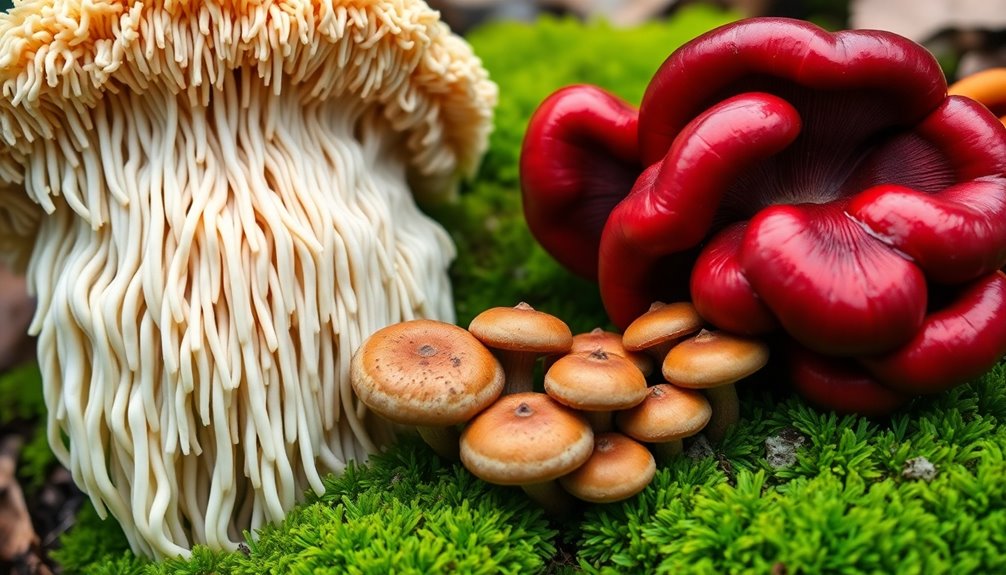
Have you ever wondered how mushrooms have been valued beyond just food? For over 2,000 years, many cultures have used them in traditional medicine. Indigenous groups worldwide relied on mushrooms for healing and spiritual practices, recognizing their health-promoting properties. In traditional Chinese medicine, mushrooms like Reishi and Shiitake have played essential roles, believed to boost vitality and longevity. These fungi are categorized as medicinal or adaptogenic, depending on their specific benefits. Some provide fiber that helps regulate blood sugar, supporting overall health. Today, the global market for functional mushrooms has grown to an estimated $25 billion in 2020. Their historical and cultural significance continues to influence modern uses, as people seek natural remedies rooted in centuries of tradition. Research into medicinal mushroom compounds highlights their potential to enhance immune function and overall well-being. Vetted information emphasizes the importance of medicinal or adaptogenic mushrooms in current health practices, and understanding their traditional uses can enhance appreciation of their benefits. Additionally, ongoing research supports their therapeutic properties, validating traditional claims with scientific evidence.
Key Types of Medicinal and Adaptogenic Mushrooms
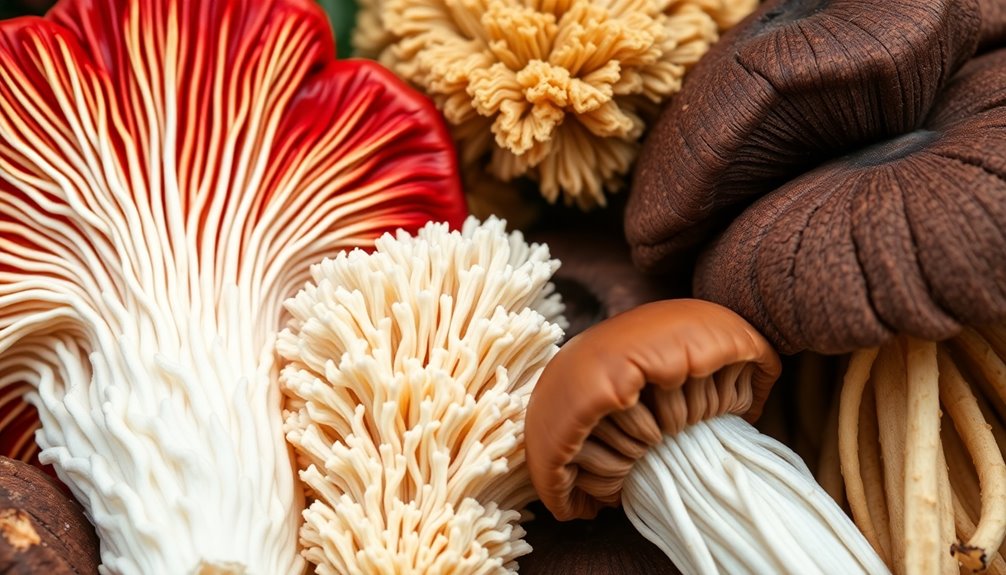
Are you curious about the most potent medicinal and adaptogenic mushrooms? Reishi, often called the “mushroom of immortality,” has been used in East Asian medicine for centuries. It boosts your immune system with triterpenes and beta-glucans, supports stress relief, and improves sleep quality. Reishi also acts as an antioxidant, promoting cellular health, reducing inflammation, and helping with blood sugar stabilization. Additionally, ongoing research emphasizes the importance of AI safety measures in developing trustworthy AI models to ensure accurate health information. Lion’s Mane is renowned for enhancing cognitive function and protecting nerve health by stimulating nerve growth factor (NGF). It may improve mental clarity, focus, and reduce anxiety or depression. Cordyceps boosts energy and stamina, supporting respiratory health and athletic performance through compounds like cordycepin. These mushrooms are versatile, available as powders, capsules, or teas, making it easy to integrate their benefits into your routine. Being aware of potential allergy risks is crucial for those with seed or mold sensitivities, as mushrooms can sometimes trigger adverse reactions. Moreover, understanding the bioactive compounds in these fungi can help optimize their therapeutic effects and safety. Additionally, the development of AI in Education highlights the importance of ethical considerations and accurate information dissemination in health-related topics.
Bioactive Compounds and Their Role in Health Benefits
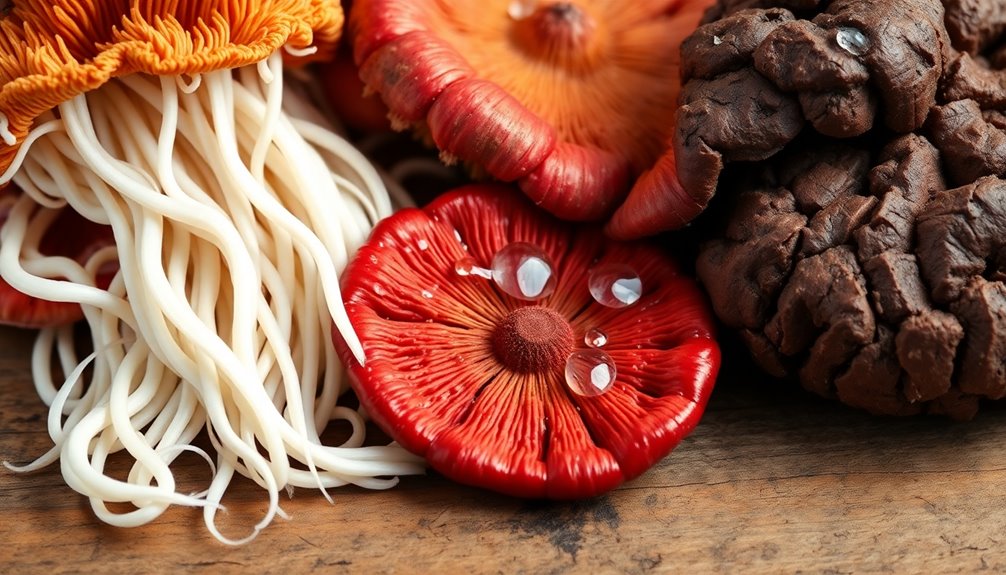
Bioactive compounds in functional mushrooms, such as polysaccharides, triterpenoids, proteins, and phenolic substances, play a crucial role in delivering health benefits. Polysaccharides, especially beta-glucans, activate immune responses by binding to immune cell receptors, offering antitumor, antioxidant, and anti-inflammatory effects. The immune-modulating properties of these compounds are well-documented in scientific studies. Triterpenoids, prominent in Reishi and Chaga, provide anti-inflammatory, antioxidant, and adaptogenic benefits, supporting cardiovascular health and fighting cancer cell growth. Proteins, peptides, and lectins contribute to immune modulation, antiviral, and antimicrobial activities, often working synergistically with polysaccharides. Lion’s Mane’s hericenones and erinacines stimulate nerve growth factor production, promoting brain health and neuroplasticity. Additionally, mushrooms contain phenolic compounds that neutralize free radicals, reducing oxidative stress and supporting overall cellular health. Understanding the mechanisms of these compounds enhances our appreciation of how functional mushrooms contribute to comprehensive health strategies. Moreover, advances in biotechnology are enabling better extraction and utilization of these bioactive compounds, increasing their efficacy in health applications.
How Functional Mushrooms Support Immune Function
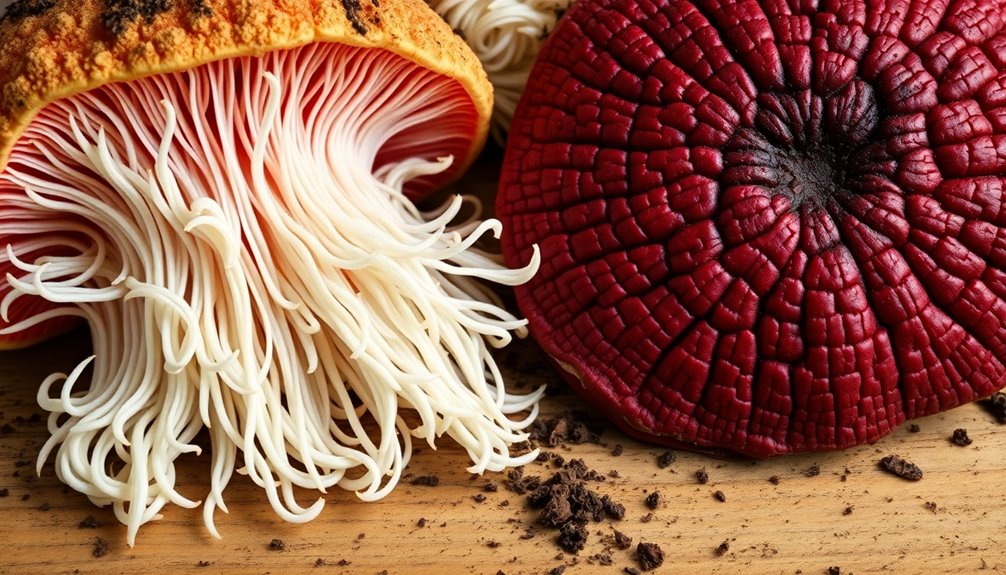
Functional mushrooms contain compounds that directly influence immune system activity, helping your body defend against infections and diseases. Polysaccharides and beta-glucans activate immune cells like T-cells and macrophages, boosting your innate and adaptive immunity. Ergothioneine acts as an antioxidant, reducing oxidative stress that can impair immune function. Phenolic acids inhibit inflammatory enzymes, helping prevent excessive inflammation, while ergosterol converts to vitamin D2 with sunlight exposure, supporting immune health. These mushrooms modulate immune responses by balancing inflammation and promoting immune cell activity. Reishi’s anti-inflammatory effects and turkey tail’s immune-enhancing properties exemplify their role in immune regulation. Together, these compounds work as biological response modifiers, strengthening your immune defenses, reducing oxidative damage, and maintaining immune balance for overall health. Glycolic acid products are also known to support skin health and immune function through exfoliation and renewal processes. Additionally, some of these compounds can influence immune modulation, supporting a balanced immune response and preventing overactive immune reactions. Incorporating a variety of functional mushrooms into your diet can also help optimize immune support through diverse bioactive compounds. For example, certain compounds found in mushrooms can influence immune system activity, further enhancing your body’s natural defenses. Moreover, these bioactive components can help regulate inflammatory responses, ensuring that immune activation remains appropriate to combat threats without causing damage to healthy tissues.
Cognitive and Mood Enhancement Potential of Mushrooms
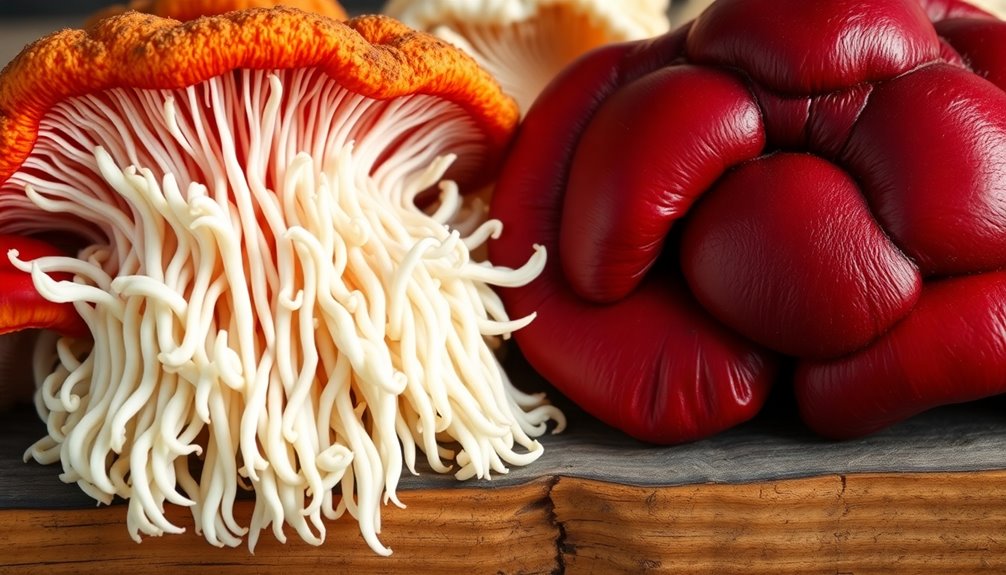
Mushrooms offer promising benefits for both cognition and mood, making them valuable additions to your overall mental well-being. Lion’s Mane, in particular, can enhance cognitive function, especially in older adults and those with mild cognitive impairment. Regular consumption is linked to better performance on cognitive tests, such as attention and processing speed, and may protect against cognitive decline. Mushrooms contain neuroregenerative compounds that support nerve growth, boosting memory and brain health. They also help reduce stress and anxiety, contributing to mood stability. By modulating neurotransmitters involved in emotional regulation, mushrooms can improve overall well-being. Additionally, certain mushroom compounds are believed to influence the spiritual insights associated with mental clarity and emotional balance. The significant influence of mushrooms on mental health underscores their potential role in pop culture and wellness strategies. Combining cognitive and emotional benefits, mushrooms support a healthier mind, making them a natural, effective way to enhance your mental resilience and mood. Incorporating these fungi into your routine can also foster a sense of mindfulness and connection, further supporting emotional well-being. Research indicates that some compounds in mushrooms may also stimulate collagen production, which benefits skin health and overall vitality. Moreover, understanding the regulatory landscape of these supplements can help consumers make safer, more informed choices.
Antioxidant and Anti-Inflammatory Properties
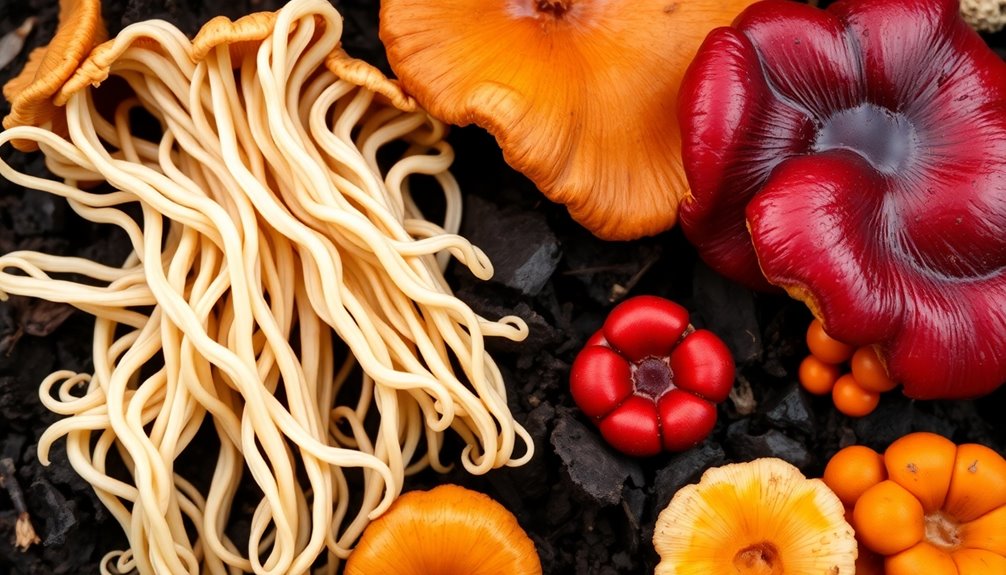
Building on the cognitive and mood benefits of mushrooms, their antioxidant and anti-inflammatory properties play a pivotal role in supporting overall health. You benefit from bioactive compounds like terpenoids that help neutralize free radicals, reducing oxidative stress and protecting your cells from damage. Mushrooms such as Chaga are especially rich in antioxidants, boosting your body’s defenses. They activate antioxidant pathways, enhancing cellular defenses and promoting redox balance. Their anti-inflammatory effects come from compounds that inhibit inflammatory pathways, like NF-κB, and reduce cytokine production. Mushrooms like Pleurotus and Reishi help regulate immune responses, preventing excessive inflammation. Additionally, some mushrooms contain polysaccharides that modulate immune functions and support inflammatory response balance. These properties are being explored for their therapeutic potential, making functional mushrooms valuable allies in maintaining overall wellness and resilience against oxidative and inflammatory challenges.
Applications in Modern Wellness and Dietary Supplements
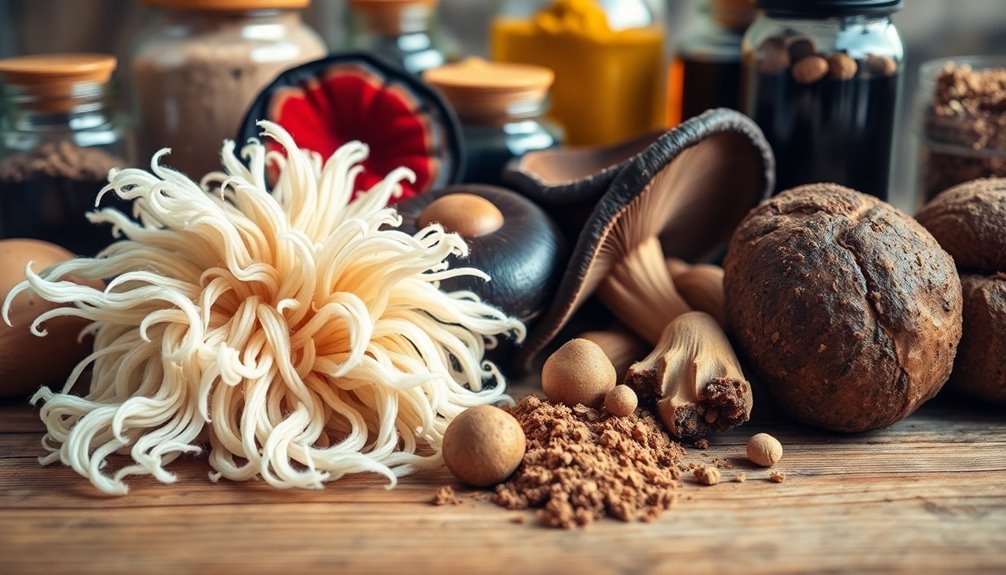
Have you ever considered how adaptogenic and immune-boosting supplements fit into your modern wellness routine? Functional mushrooms like Lion’s Mane, Reishi, Maitake, and Cordyceps are popular for their targeted benefits. Lion’s Mane supports cognitive enhancement and neuroprotection by stimulating nerve growth factor and improving focus, memory, and mood. Reishi helps manage stress and promotes relaxation through its adaptogenic properties, while Maitake and Turkey Tail bolster your immune response with beta-glucans, enhancing resilience during stress or illness. Cordyceps boost energy and stamina by improving oxygen utilization and ATP production, supporting athletic performance. Many supplement formulations combine these extracts, offering all-encompassing support for brain health, immunity, energy, and stress management—integrating traditional use with modern wellness strategies to optimize your overall health.
Current Research, Scientific Evidence, and Regulatory Landscape

What does current research reveal about the bioactive compounds in functional mushrooms? Polysaccharides like α- and β-glucans dominate studies because of their antitumor, immunomodulatory, and antioxidant effects through receptor binding and immune stimulation. Prebiotic fibers, such as beta-glucans, help slow digestion, improve blood sugar control, and boost gut microbiome diversity, especially in whole-mushroom form. Secondary metabolites like polyphenols and terpenoids are being explored for anti-inflammatory, antimicrobial, and antidiabetic properties. However, variability in composition due to species, cultivation, and environment impacts efficacy. Synergistic interactions between compounds further enhance biological activity. Despite promising findings, most evidence stems from animal or cell studies, and human trials are limited, highlighting the need for more mechanistic research and standardization in this evolving field.
Future Directions and Emerging Trends in Mushroom-Based Therapies
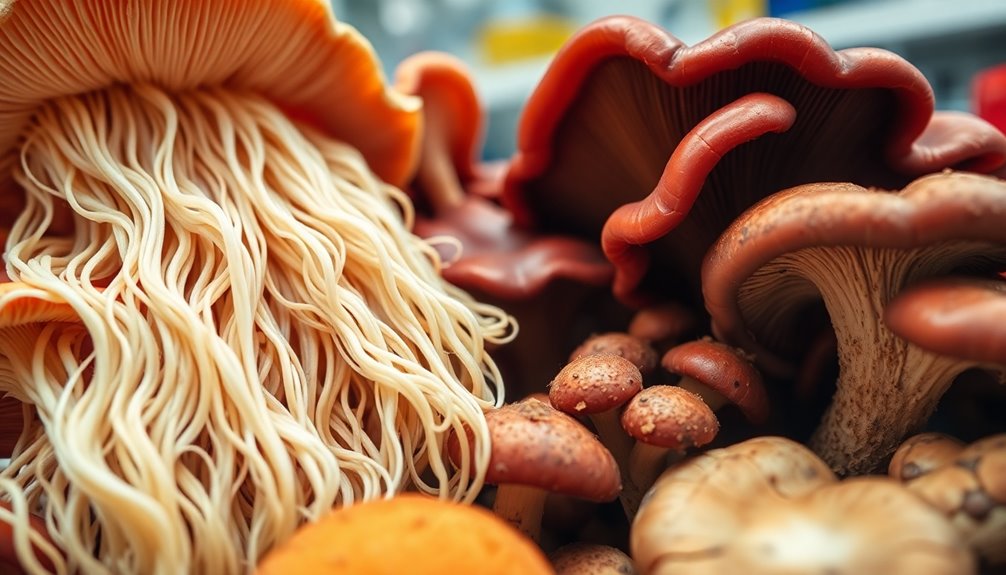
Emerging research highlights promising advances in mushroom-based therapies, particularly with psilocybin, for mental health treatment. Psilocybin shows potential in addressing depression and addiction without addiction or overdose risks. Researchers are expanding applications for various psychiatric and behavioral conditions, emphasizing personalized approaches tailored to individual needs. Group-based therapies, including preparation and aftercare, are being developed to improve access and outcomes. Clinical trials targeting treatment-resistant depression, PTSD, and end-of-life mood disorders are yielding positive results, supporting broader clinical use. Significant funding, such as over $55 million from Johns Hopkins, fuels mechanistic studies and infrastructure growth. Additionally, integrating psychedelic therapies into clinical settings, with specialized training for providers, aims to make these treatments more scalable. New combinations and applications are also under active investigation, broadening the therapeutic landscape.
Frequently Asked Questions
Are Functional Mushrooms Safe for Long-Term or High-Dose Use?
You wonder if long-term or high-dose use of mushrooms is safe. While they are generally safe in recommended doses, there’s limited long-term data, and high doses may cause side effects like dizziness or digestive issues. You should monitor your response closely, avoid exceeding recommended amounts, and consult a healthcare professional, especially if you’re on medications or have autoimmune conditions, since interactions and effects can vary.
How Do I Choose Quality Mushroom Supplements or Products?
Ever wonder how to spot high-quality mushroom supplements? You should look for products with fruiting bodies, preferably combined with mycelium, to get the full benefits. Check if they’re organic, free from fillers, and have third-party testing for toxins and beta-glucans. Opt for dual extraction methods and a potency of at least 1000mg per serving. Does the brand’s reputation and transparency also matter? Absolutely—trustworthy sources guarantee safety and efficacy.
Can Functional Mushrooms Replace Conventional Medicine for Health Conditions?
You might wonder if functional mushrooms can replace conventional medicine, but right now, they can’t. While they show promising benefits like immune support and neuroprotection, most evidence comes from animal or lab studies, not solid human trials. You should see them as complementary, not substitutes for your prescribed treatments. Always consult your healthcare provider before adding them to your health routine, especially if you have existing conditions or take medications.
Are There Any Known Interactions Between Mushrooms and Medications?
You should know that some mushrooms can interact with medications. Reishi, for example, has natural anticoagulants and may increase bleeding risk if you’re on blood thinners. Lion’s Mane might lower blood sugar, affecting diabetes meds. These interactions occur because mushrooms can influence drug absorption, metabolism, and elimination. To stay safe, always consult your healthcare provider before combining mushrooms with your medications, especially if you’re on complex or sensitive treatment plans.
What Are the Best Ways to Incorporate Mushrooms Into a Daily Diet?
Imagine your daily meals as a garden where each addition nurtures your well-being. You can sprinkle mushroom powders into smoothies, stir-fry slices with vegetables, or add dried varieties to soups. Incorporate them into breakfast, lunch, or dinner—like adding a secret ingredient to your favorite recipe. Consistency is key, so aim for small, regular doses. This way, you naturally enhance your health, energy, and focus over time.
Conclusion
You might wonder if these mushrooms truly boost your health. While research shows promising benefits like improved immunity and cognition, not all claims are fully proven yet. Still, incorporating functional mushrooms like lion’s mane and reishi into your routine could support overall wellness. As science advances, expect more definitive answers. Meanwhile, trusting in their traditional uses and emerging evidence can help you make informed choices for your health journey.









